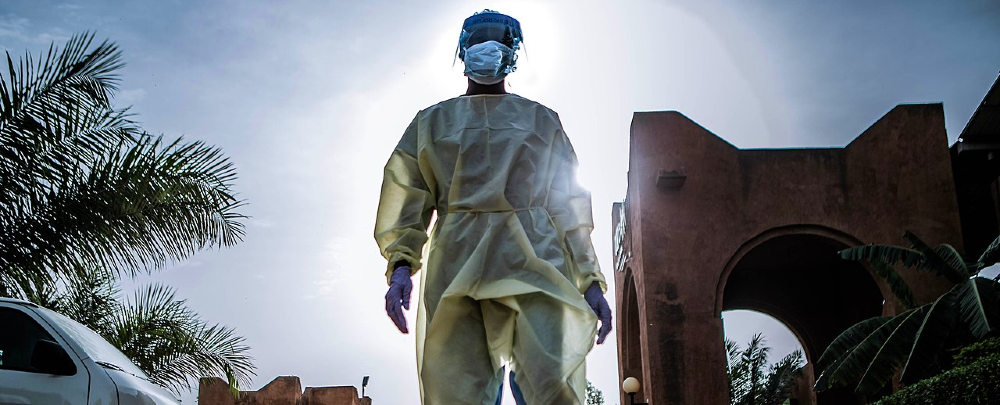
A nurse in Niger returning from her shift screening patients. (Photo: Anna Psiaki) COVID-19 Response
Africa faces the world’s most dramatic public health burden in any given year, given its constant fight against recurring and infectious diseases. The emergence of the COVID-19 pandemic and the stress it has caused to some of the world’s most advanced health systems, therefore, was soberly noted by Africa’s public health community. With high levels of poverty, urban density, widespread infectious diseases, limited access to healthcare, and overcrowded informal settlements, Africa faces a preponderance of risk factors that threaten to exacerbate the pandemic on the continent.
Given these challenges, many African countries followed the global trend of imposing shutdowns of businesses and human movements. Yet, with 70 percent of some African populations relying on subsistence livelihoods, it was understood that this would only be a temporary solution. Africa’s response to the pandemic would need to be customized to its own realities, challenges, resources, and strengths. This has spurred a number of innovations and adaptations to the coronavirus response in Africa—initiatives that continue to unfold.
Presidential Task Forces and COVID-19 response
Many African countries have created presidential COVID-19 task forces of public health and sectoral experts as an institutional innovation to guide the pandemic response. The central role of professionals in these task forces has elevated the emphasis on science and evidence-based planning. In Uganda, a Presidential Scientific and Strategic Advisory Committee assembled economists, anthropologists, epidemiologists, public health experts, virologists, and lawyers to design and deliver an effective approach addressing various facets of the crisis.
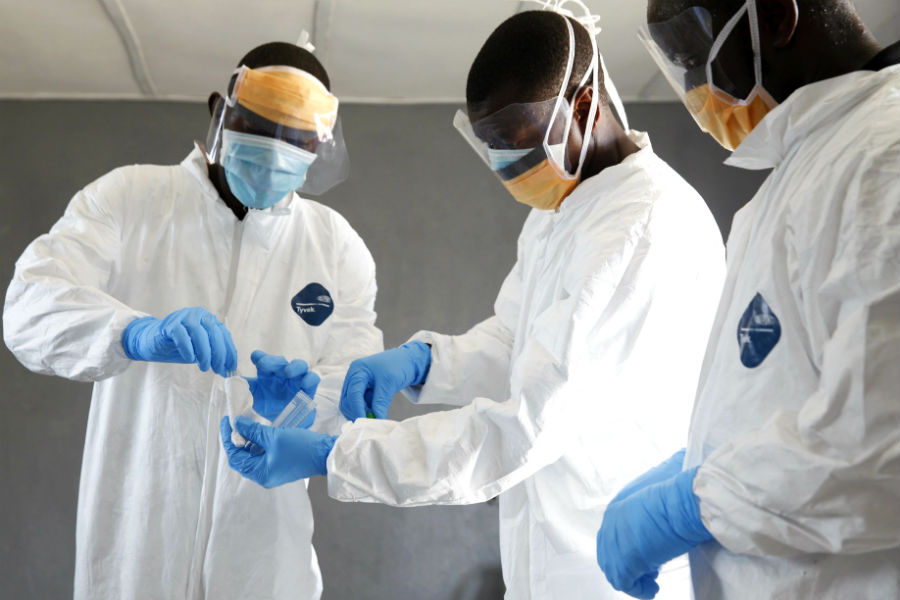
Researchers take a sample swab at C.H. Rennie Hospital in Kakata, Liberia. (Photo: World Bank/Dominic Chavez)
The prominence of the members of these presidential task forces has facilitated the absorption of lessons and experiences from other parts of the world. African countries now have a better understanding of the nature of the pandemic, its challenges, and myths. COVID-19 response strategies have also benefited widely from the professional and scientific advice of highly credentialed African experts from well-recognized bodies like the African Epidemiology Association and the Royal College of Pathologists.
The result has been an aggressive effort to mount tailored and scientifically and culturally sound public health actions, with an aim on preventive interventions, rather than relying on a therapeutic approach that would overwhelm the limited treatment options at Africa’s hospitals.
The presidential task forces are also drawing on Africa’s extensive experience in pandemic outbreaks. Nigeria is a good example. Using lessons from the 2014 West Africa Ebola outbreak, Nigeria quickly set up isolation clinics separate from the regular health system to treat coronavirus patients. The idea is to avoid inundating the established health system so that it can continue serving other pressing needs such as malaria, tuberculosis, and HIV/AIDS within the population. This model is in place in around 20 countries.
“The prevalence of COVID-19 task forces has facilitated information exchanges between African countries to share lessons and best practices.”
The interagency coordination fostered by these task forces has created opportunities to address the role of the security forces in creating a conducive environment for responding to the pandemic. In Uganda, the military police was tasked with monitoring soldiers to ensure that stay-at-home orders are implemented humanely. This was after public complaints about harassment by local defense units enforcing the lockdown. The backlash prompted the Chief of Defense Forces to publicly apologize to three victims of the violence. President Yoweri Museveni established an emergency hotline where the public could report abuses, which curtailed police entering people’s homes during curfews. In South Africa, the behavior of the security forces during the state of emergency is being monitored by the Independent Police Investigation Directorate.
The prevalence of COVID-19 task forces has facilitated information exchanges between African countries to share lessons and best practices. Some of this coordination is occurring through Regional Economic Communities, which has accelerated the sharing of lessons. For example, the COVID-19 task forces in Southern Africa exchange information through a Regional Technical Committee established by the Southern African Development Community (SADC), consisting of the directors of public health and medical services of member states.
Staggered Movement Controls to Boost Livelihoods and Access to Food Markets
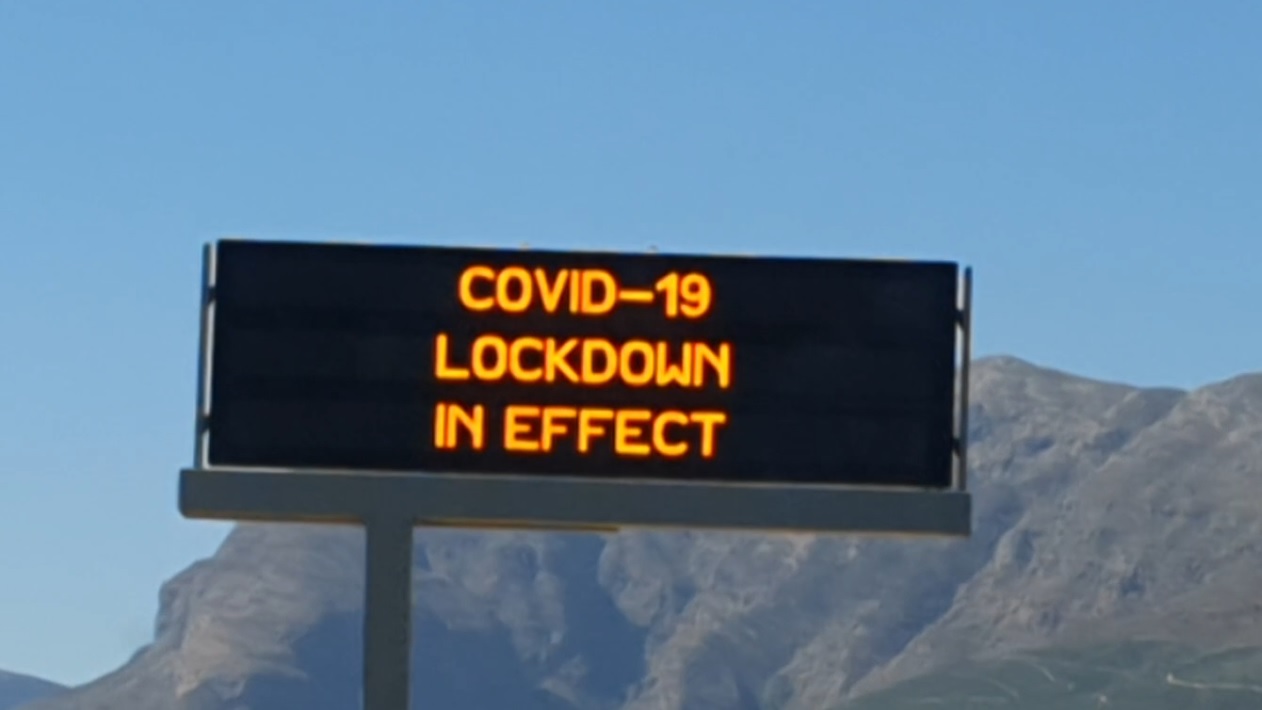
An electronic highway sign in Western Cape, South Africa. (Photo: Brandon Gregory)
Given Africa’s high levels of poverty, lockdowns without social protection plans could lead to severe consequences, including starvation and the depletion of coping mechanisms, particularly among the most vulnerable. Clashes between citizens defying movement restrictions and security forces have led to deaths and injuries in Nigeria, Rwanda, South Africa, and Uganda. Some countries have shifted to a curfew-based strategy with strict movement controls, recognizing that the informal sector provides jobs for the vast majority of citizens who need to work to feed their families.
African countries have adjusted differently to these realities. Ghana decided against a full lockdown, opting instead for a partial one backed by vigorous contact tracing and monitoring, strengthened behavior change messaging, and the provision of sanitary facilities and free water to vulnerable communities. As part of these measures, 1,300 people were assigned to disinfect 137 food markets around Greater Accra to ensure that people can access food without compromising new health requirements. Rwanda likewise disinfected and decongested its food markets, provided sanitary facilities along key rural-urban corridors, and delivered food and non-food items to vulnerable communities.
In Uganda, market vendors adopted self-monitoring measures to ensure compliance with emergency health regulations or face closure. Botswana’s COVID-19 economic response plan requires the government to procure food from local communities, redirect excess supplies of vegetables back to the rural economy, and establish milk collection centers in communal areas. These measures are designed to boost household livelihoods during the emergency.
Senegal’s COVID-19 Presidential Task Force established numerous mobile response teams equipped to respond immediately and take samples when illnesses have been reported.
“African populations have developed culturally relevant epidemic coping mechanisms over the years that make them amenable to appeals for behavior change.”
A common coping strategy in times of stress is for urban-based families to return to their rural homes for economic and livelihood sustenance. Facilitating this population movement can reduce the risk of rapid transmission in high-density urban areas while addressing food security challenges. Such movements, however, raise the risk of accelerating the spread of the virus to rural areas, which may not have much exposure. Accordingly, a number of countries, including Botswana, Ghana, Nigeria, and South Africa, have established mobile testing capabilities along major transportation routes to try and identify individuals who are carrying the virus and provide them treatment. Burundi, Kenya, Rwanda, South Sudan, and Tanzania have each set up mobile laboratories and testing units to ramp up mobile testing along cross-border transportation corridors, an idea adopted from the 16-member SADC.
Nigeria’s COVID-19 Presidential Task Force has a cultural arm that reinforces behavior change interventions through cultural messaging and comedy performances. Given their ongoing exposure to infectious disease, African populations have developed culturally relevant epidemic coping mechanisms over the years that make them amenable to appeals for behavior change. Africa’s public health systems have developed considerable skill in soliciting appropriate health behaviors to promote prevention and redirect people away from intensive care facilities. Africa’s public health systems have a wide range of context-specific tactics they have used during mass immunization campaigns for polio, distribution of bed nets to combat malaria, and testing and screening for yellow fever, all of which are part and parcel of what African health workers have done for decades.
Targeting Vulnerable Populations
Innovations have also been implemented to support those households most vulnerable to restrictions on mobility and the economic hardships this creates. Helping them meet basic livelihood needs such as access to food can reduce the threat of spread in Africa’s many sprawling urban informal settlements where COVID-19 could spread like wildfire due to massive congestion, poor hygiene, and pre-existing health conditions. The U.S.-based Ethiopia Diaspora Trust Fund provided a $1 million start-up fund to assist COVID-19 mitigation efforts in Ethiopia, including food assistance and direct cash transfers to vulnerable families.
In Kenya’s informal settlements of Kawangware, Mathare, and Majjengo, indigenous organizations such as Mutual Aid Kenya, Sarafu Credit, the Kenya Red Cross Society, and Zakat Kenya are reinforcing the government’s response strategy by identifying at-risk families and providing targeted assistance through direct cash transfers, food parcels, and alternative supply chains to provide essential commodities. Sarafu Credit is using a block-chain–backed system of community currencies (credit vouchers) that communities in informal settlements can use to purchase food and other essentials.
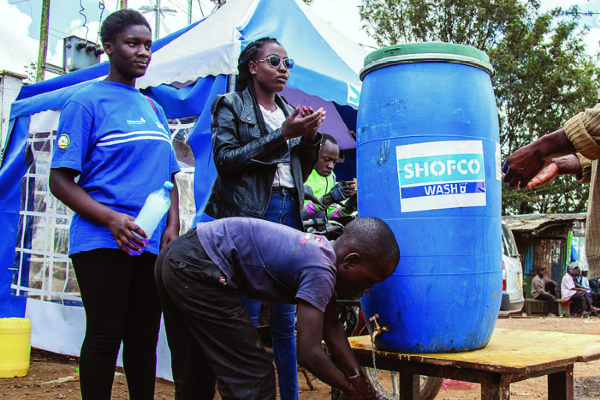
Local COVID-19 response: A Shofco handwashing station in Kibera, Nairobi. (Photo: Shofco.org)
In Kibera, the largest of these settlements, a community-run organization called Shofco has established hand-washing stations, community toilets, and clean-water kiosks in all access points, staffed by volunteers and a network of health workers. Well over half of the population of the settlement—139,000 people—have subscribed to a WhatsApp platform that provides information about the virus, the patterns of infection in Kibera, and what they should do to protect themselves and the community. Three thousand of the area’s most vulnerable families are receiving a direct cash transfer of $24 per month for 3 months to meet their basic needs, with financing coming from the local private sector and the Kenya diaspora in North America.
These efforts are modeled on a Kenya government pilot initiative implemented during the 2009-2010 drought that provided $20 per month to 40,000 families in informal settlements for 9 months to meet their basic food needs.
In Botswana, a wage subsidy totaling 1 billion pula ($84 million) has been provided to small businesses as an incentive to retain their employees during the shutdown. In addition, the government will contribute 50 percent of the basic salary of every furloughed citizen or permanent resident for 3 months, along with a subsidy of 1,000-2,000 pula ($80-$168) per month to meet basic needs.
Combating Misinformation
As COVID-19 continues to spread around the world, so too have rumors, misinformation, and fake news about the pandemic. Videos, voice messages, texts, and stories have swirled around conflicting information, from unproven cures to bizarre claims that Africans are somehow immune from COVID-19, despite an abundance of contrary evidence.
Africans are reacting to the challenge in different ways. In South Africa, a private firm, Praekelt.org, created a WhatsApp-based helpline that provides real-time data and automated responses in numerous languages to educate and sensitize. The app registered 3.5 million subscribers within the first 10 days of launching. Praekelt.org has now partnered with the World Heath Organization to create a similar service to reach a global audience.
“Many presidents and senior health leaders are … using their daily briefings to dispel rumors and misinformation about COVID-19.”
Africa Check, Africa’s pioneer fact-checking organization provides a dedicated COVID-19 service in partnership with Facebook. Facebook is also working with Nigerian media agencies to combat misinformation on social media. The Nigerian Presidential COVID-19 Task Force has also established a 24-hour hotline providing up-to-date information to inform and protect the public from misinformation and rumors. Many presidents and senior health leaders are also using their daily briefings to dispel rumors and misinformation about COVID-19.
Public-Private Partnerships
In South Africa, a Solidarity Response Fund was established as a public-private partnership to channel resources toward preventing transmission of the virus, understanding the magnitude of the pandemic, caring for patients, and supporting vulnerable communities. Over $50 million was raised through voluntary contributions.
Uganda’s Red Cross is distributing food items to communities in informal settlements around Kampala through a national COVID-19 fund established by the Prime Minister’s office. The country’s oldest educational institution, Makerere University, has developed a prototype low-cost ventilator using designs from the Massachusetts Institute of Technology.
In Kenya, a local factory that used to make clothing quickly pivoted its production and is now turning out 30,000 surgical masks a day. In Kibera, a community-owned company is making hand sanitizer, masks, and protective clothing for the community, other informal settlements, and the Kenyan national stockpile. The proceeds are ploughed back into the area to support contact tracing, and isolation and treatment of patients in partnership with the Ministry of Health. Zimbabwe’s universities are manufacturing gloves, hand sanitizers, and masks despite a lockdown, spiraling inflation, and an economic meltdown.
Some Lessons Thus Far
Africa continues to face an uphill battle against COVID-19, given its limited resources, fragile health systems, existing disease burden, urban density, conflict, and record levels of population displacement. Nonetheless, African governments and societies have demonstrated a noteworthy level of responsiveness, cooperation, and adaptability to the pandemic.
“Previous epidemic outbreaks provide vital lessons, local knowledge, and expertise.”
Several lessons have emerged thus far. One is the importance of enabling experts to guide the response. The adaptation of intersectoral presidential task forces composed of leading scientists and practitioners has created a high-level platform to harness Africa’s hard-earned expertise in combating public health crises. Operating with presidential authority has accelerated decision-making for many governments while reducing interagency squabbles.
Another lesson is that previous epidemic outbreaks provide vital lessons, local knowledge, and expertise to guide the response to the coronavirus pandemic. When the virus arrived in Africa, many of the countries affected by the 2014 Ebola outbreak in West Africa and the current outbreak in the Democratic Republic of the Congo have brought their isolation centers back online as a strategy to separate COVID-19 treatment from regular healthcare facilities. This experience has also emphasized the need for Africa to focus on preventative rather than therapeutic strategies in limiting the spread of the virus.
Also shown to be relevant is the value of empowering affected communities to design responses tailored to address the complexities of their unique local contexts. This is what has been happening in Kibera and other informal settlements. Given the importance of timeliness and building on existing institutions, such locally adaptive efforts are vital.
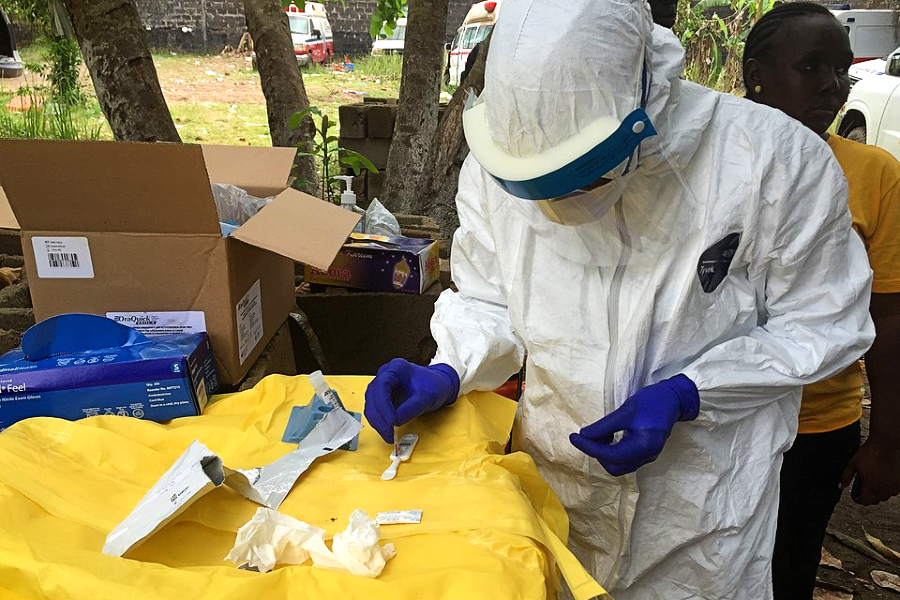
Disease detectives conducting testing out in the field during the 2014 Ebola outbreak in Liberia. (Photo: CDC Global)
A further lesson is that effective pandemic responses depend on high levels of trust between the government, health professionals and scientists, the public, and private sector. This takes many forms. Respect for human rights in the course of the response is key if popular support is to be maintained for what will need to be a sustained period of cooperation. Experience shows that heavy-handed responses to enforce stay-at-home orders depletes public trust and triggers defiance. This defeats the purpose of these efforts to limit mobility in the first place.
Trust is also indispensable to elicit the behavior change on which Africa depends to confront this crisis. This was the key to containing the 2014 Ebola outbreak in Liberia according to Gyude Moore, who helped lead the country’s response to the pandemic. “The precipitous drop in infections came through behavioral change by the general public. And that only happened once community engagement and trust were made a central part of the response.”
Additional Resources
- Kennedy Odede, “We’re Taking Matters into Our Own Hands,” The Guardian, April 13, 2020.
- Mark Duerksen, “Innovations Needed to Prevent COVID-19 from Catching Fire in Africa’s Cities,” Spotlight, Africa Center for Strategic Studies, April 9, 2020.
- Africa Center for Strategic Studies, “Mapping Risk Factors for the Spread of COVID-19 in Africa,”Infographic, April 3, 2020.
- Shannon Smith, “Managing Health and Economic Priorities as the COVID-19 Pandemic Spreads through Africa,”Spotlight, Africa Center for Strategic Studies, March 30, 2020.
- Wendy Williams, “COVID-19 and Africa’s Displacement Crisis,”Spotlight, Africa Center for Strategic Studies, March 25, 2020.
- Catesby Holmes, “Why a One-Size-Fits-All Approach to COVID-19 Could Have Lethal Consequences,” The Conversation, March 23, 2020.
- Gyude Moore and Tolbert Nyenswah, “How Can We Prepare for Coronavirus? Learn from Liberia’s Experience with Ebola,” Mail and Guardian, March 8, 2020.
More on: COVID-19 Health & Security

